Welcome to Behind the Wall, your weekly digest on what is happening in the climbing competition world.
This week, I look at how the new IFSC Boulder points system played out at the recent IFSC Europe continental cups.
As usual, I recap the news over the last couple of weeks and share my favourite media. I also recap where you can buy tickets for upcoming international competitions and what competitions you can watch this weekend.
How is the New Boulder Points Format Going?
There have been 5 competitions using the new points format for bouldering: the Boulder Japan Cup, the IFSC European Cups in Munich and Rome, the IFSC Asia Cup in Hong Kong, and the North American Cup Series Boulder competition in Greenville.
I took a closer look at the IFSC Europe Cups to see how the new points system is working.
There are a few differences between the IFSC Europe Cups and the World Cup.
First, qualification rounds in the IFSC Europe Cups have six qualification boulders, split into two groups of three, with athletes having 4 minutes for each boulder in a flash round format (athletes can see the boulders before hand).
The semi-final and final rounds follow the IFSC World Cup format, but athletes have 4 minutes to climb, with a 2 minute observation time per boulder in each round.
What Scores are Athletes Scoring?
In the new scoring system,
- a top is worth 25 points,
- a zone is worth 10 points, and
- a fall scores -0.1 points.
Athletes can score up to 150 points in the qualification round because there are six boulders. Athletes can score up to 100 points in the semi-final and final rounds, as there are only four boulders per round.
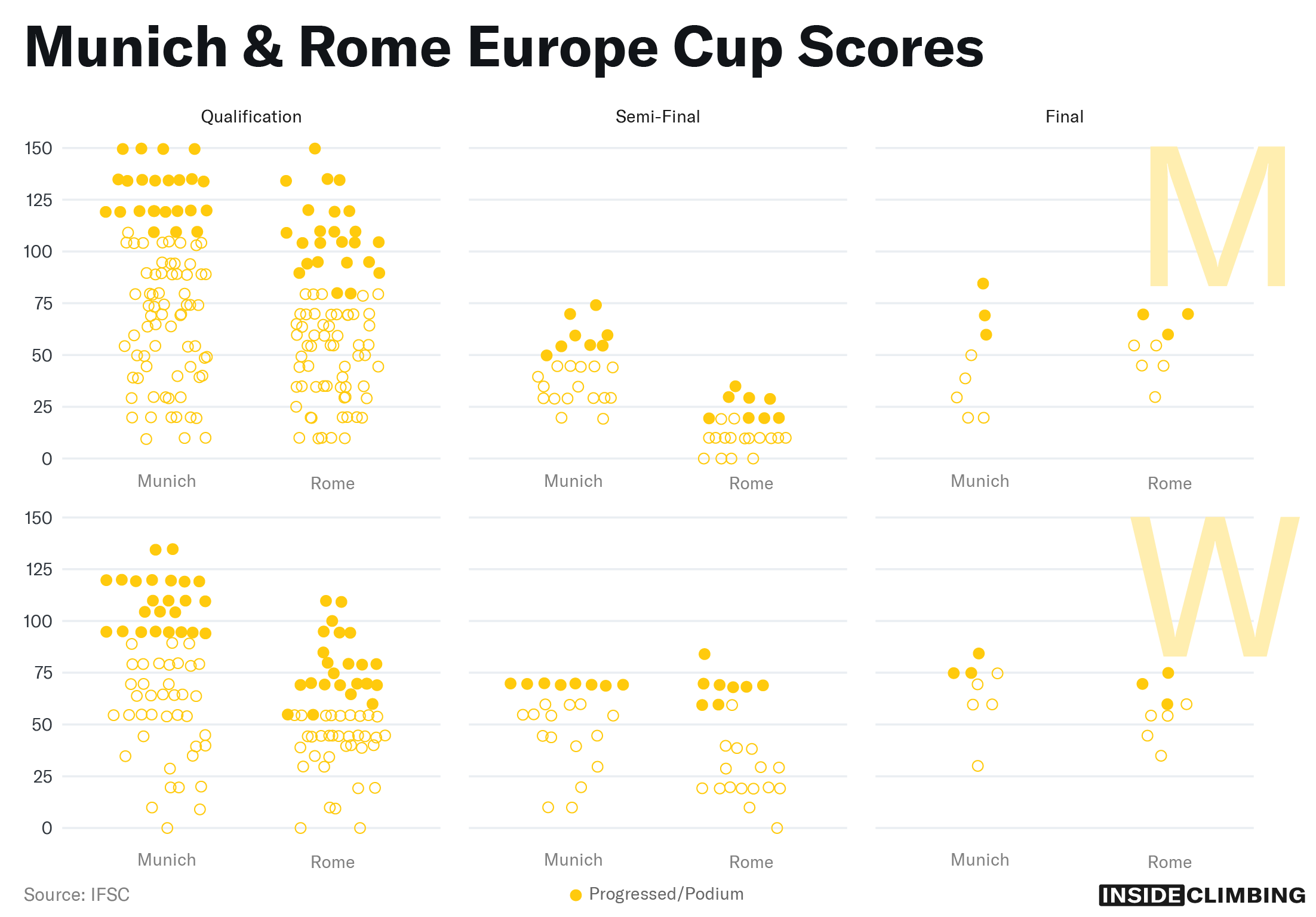
The points scored at both events ranged widely. No athlete got close to scoring the full 100 points available in the semi-final or final at either competition. Men's semi-final round in Rome was particularly difficult, with no athlete scoring more than 35 points and several scoring zero.
There have been quite a few ties across the rounds – times when at least two athletes were awarded the same score. For the semi-final and final rounds, count-back guaranteed that no athletes were tied.
| Round | Sex | Munich non-unique scores | Rome non-unique scores |
|---|---|---|---|
| Qualification | M | 32 | 29 |
| Semi-Final | M | 21 | 5 |
| Final | M | 2 | 2 |
| Qualification | W | 20 | 20 |
| Semi-Final | W | 6 | 5 |
| Final | W | 0 | 2 |
What Points are Needed to Progress?
To see what scores were needed to progress, I looked at the lowest score of the athletes who progressed to the next round: 24th in qualifications, and 8th in semi-finals. In the final round, I calculated the lowest score needed to reach the podium.
| Round | Sex | Munich Score | Rome Score |
|---|---|---|---|
| Qualification | M | 109.3 | 79.7 |
| Qualification | W | 94.0 | 54.7 |
| Semi-Final | M | 49.8 | 19.4 |
| Semi-Final | W | 68.7 | 59.4 |
| Final | M | 59.8 | 59.9 |
| Final | W | 74.8 | 59.8 |
The scores needed to progress to the next round were a lot lower in Rome than in Munich. The scores are lower for women than men in qualifications, but flipped for the semi-final and final. This suggests that the semi-final and final rounds for men were harder than for the women.
How Many Athletes are Affected By the Changes?
This is the first season using the new scoring system, so let's look at how many athletes' ranks would have changed had we used the old system.
| Round | Sex | Competition | Total | # Rank Changes | Percentage Change |
|---|---|---|---|---|---|
| Qualification | M | Munich | 93 | 51 | 55% |
| Qualification | M | Rome | 84 | 59 | 70% |
| Qualification | W | Munich | 63 | 42 | 67% |
| Qualification | W | Rome | 59 | 34 | 58% |
| Semi-Final | M | Munich | 24 | 9 | 38% |
| Semi-Final | M | Rome | 24 | 9 | 38% |
| Semi-Final | W | Munich | 23 | 10 | 43% |
| Semi-Fina | W | Rome | 24 | 7 | 29% |
| Final | M | Munich | 8 | 0 | 0% |
| Final | M | Rome | 8 | 2 | 25% |
| Final | W | Munich | 8 | 0 | 0% |
| Final | W | Rome | 8 | 0 | 0% |
Qualifications were the most affected as more athletes scored lower points in this round. Lower scores are more affected by the change in scoring system due to zones being worth 10 points. Most of the rank changes happened outside, or within, the top 24. There was no difference between the athletes who moved into semi-finals on either system at either competition.
In Munich, none of the athletes in the semi-final top 8 would have moved out of the top 8.
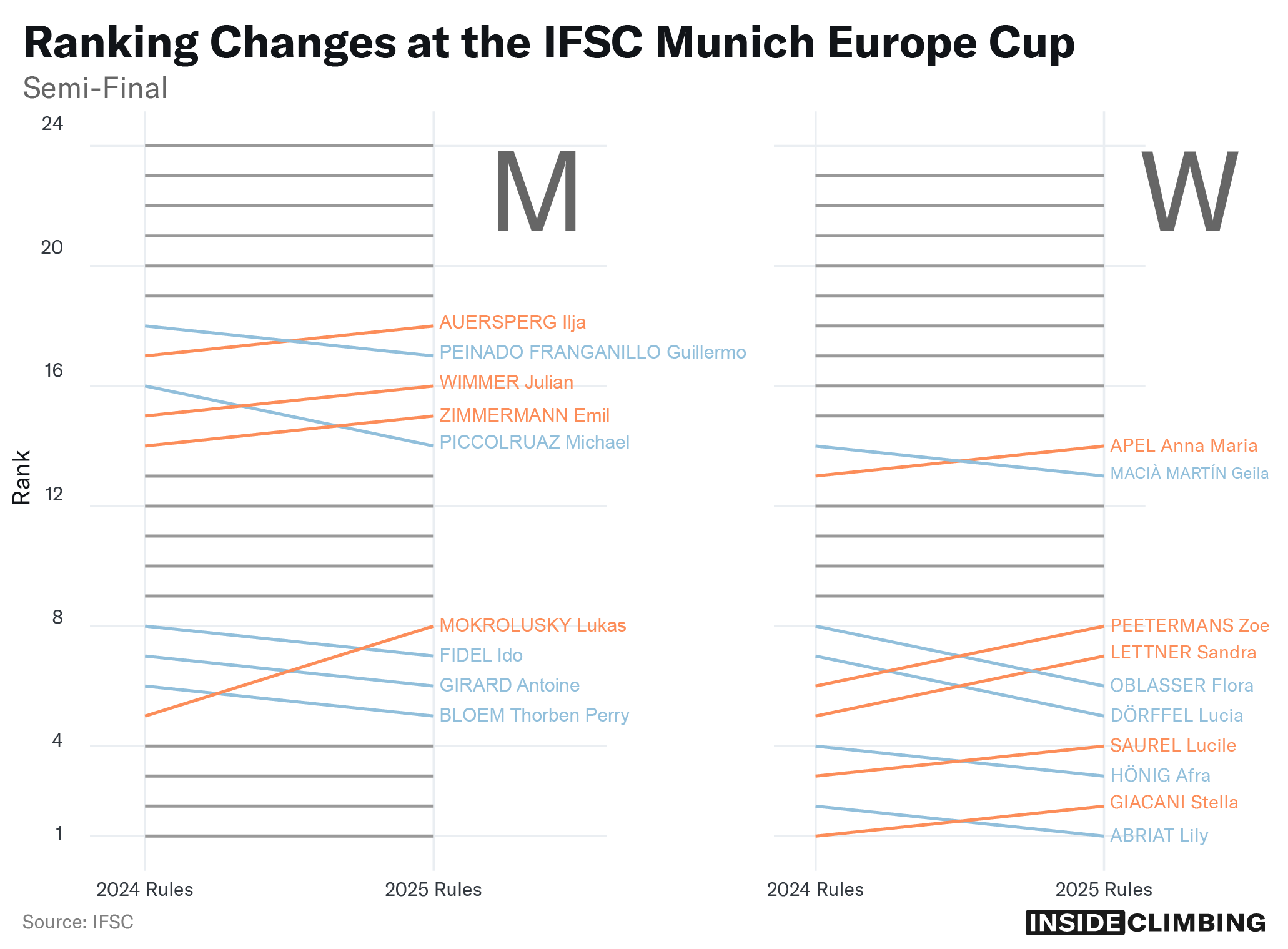
In Rome this was not the case. Alma Bestvater (GER) moved into the final on the new system by 0.2 points. On the old system she would have finished ninth.
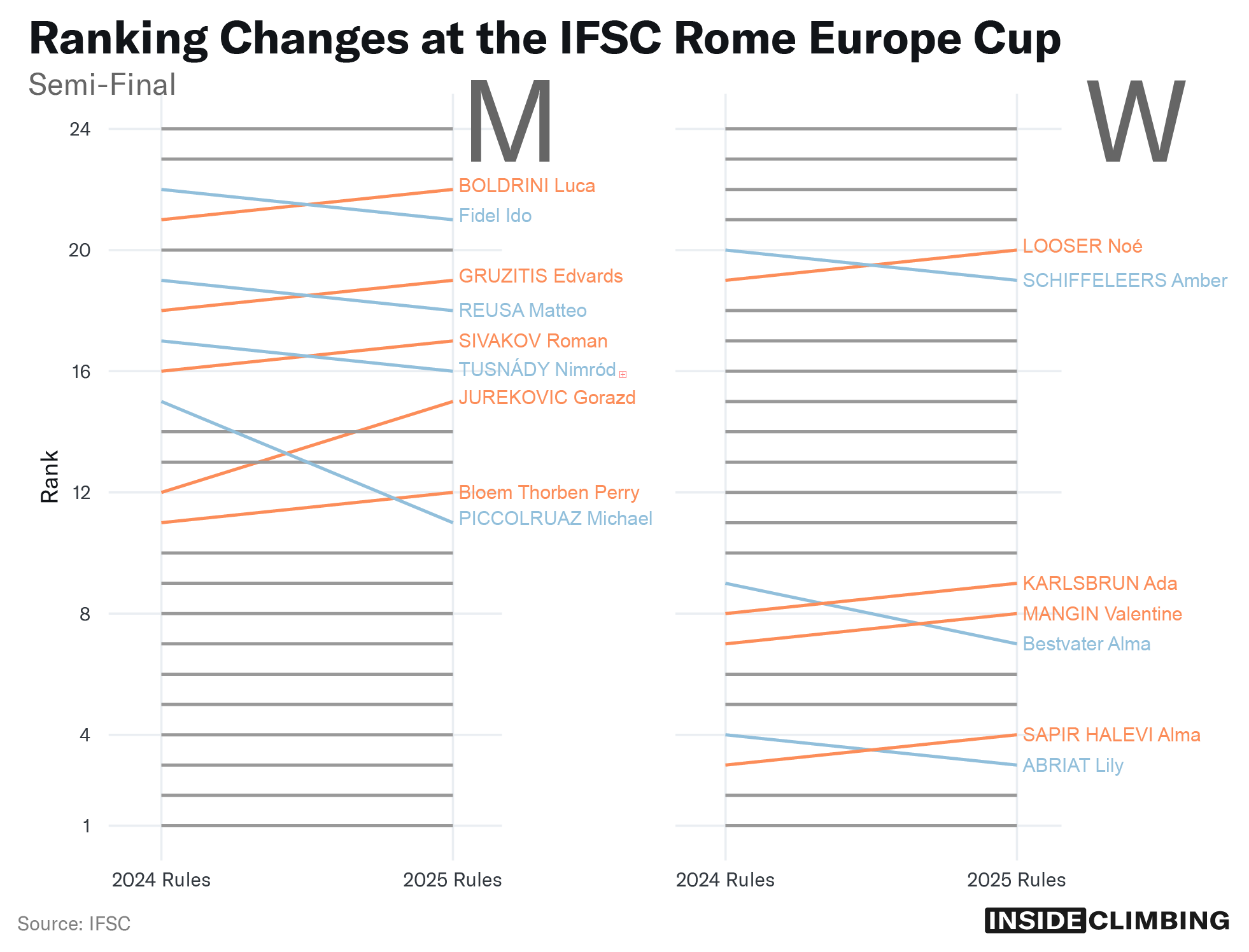
The finals had the least amount of change, with only Samuel Richard (FRA) and Lukas Mokrolusky (CZE) swapping places in Rome because Mokrolusky got his top faster than Richard, but a zone slower.
The new format is a first draft and the changes have the biggest effect on qualifications where there are lower scores. The importance of zones and changes to how falls are scored have led to more ties, but these don't affect the semi-finals and finals due to count-back.
I plan to continue looking at the effects the new system has on scoring across the season.
News
- The IFSC announced that Sport Climbing will have 3 sets of medals for Speed, Boulder and Lead in LA2028. The quota of athletes also increased from 68 to 76 athletes for LA. How this quota will be split across the 3 disciplines is still to be decided.
A communication from the IOC stated: “The IOC Executive Board has approved six events for men's and women's Lead, Speed, and Boulder climbing, with a total quota of 76 athletes (38 women and 38 men).
“The specific allocation of these quota places across the events will be finalised in the Olympic Qualification System, including the potential for athletes to compete in multiple events.”
Oriane Bertone has said on Instagram that she is attending the Boulder World Cups in Keqiao (China), Curitiba (Brazil) and Salt Lake City (USA). She said in an interview last year that she was planning to skip the early part of the season after struggling post-Olympics.
- The IFSC have renewed their Eurosport deal with Warner Brothers Discovery. This means the only way to watch climbing in the UK is using TNT Sports.
- Innsbruck World Cup passes for the whole event sold out in under 2 hours. Tickets for individual events will be released later in April and June.
IFSC European Cup Rome Result
France won 5 medals in Rome with Stella Giacani being the only non-French athlete to win a medal. You can re-watch the competition on the IFSC Europe YouTube channel with Matt Groom commentating.
- Women: 1. Lily Abriat (FRA), 2. Stella Giacani (ITA), 3. Lucile Saurel (FRA)
- Men: 1. Leo Favot (FRA), 2. Antoine Girard (FRA), 3. Noé Moutault (FRA)
NACS Greenville Boulder Results
The competition uses the new IFSC Boulder points system like the IFSC European cups did.
You can re-watch the competition on the USA Climbing YouTube channel.
- Women: 1. Melina Costanza (USA), 2. Jojo Chi (USA), 3. Evangelina Briggs (CAN)
- Men: 1. Dillon Countryman (USA), 2. Matthew Rodriguez (CAN) , 3. Zander Waller (USA)
Media Recommendations
Sam and Aidan interview Jonathan Sin about trying to become a pro climber on the Hong Kong National team, what makes Japanese gyms special, and his thoughts on social media.
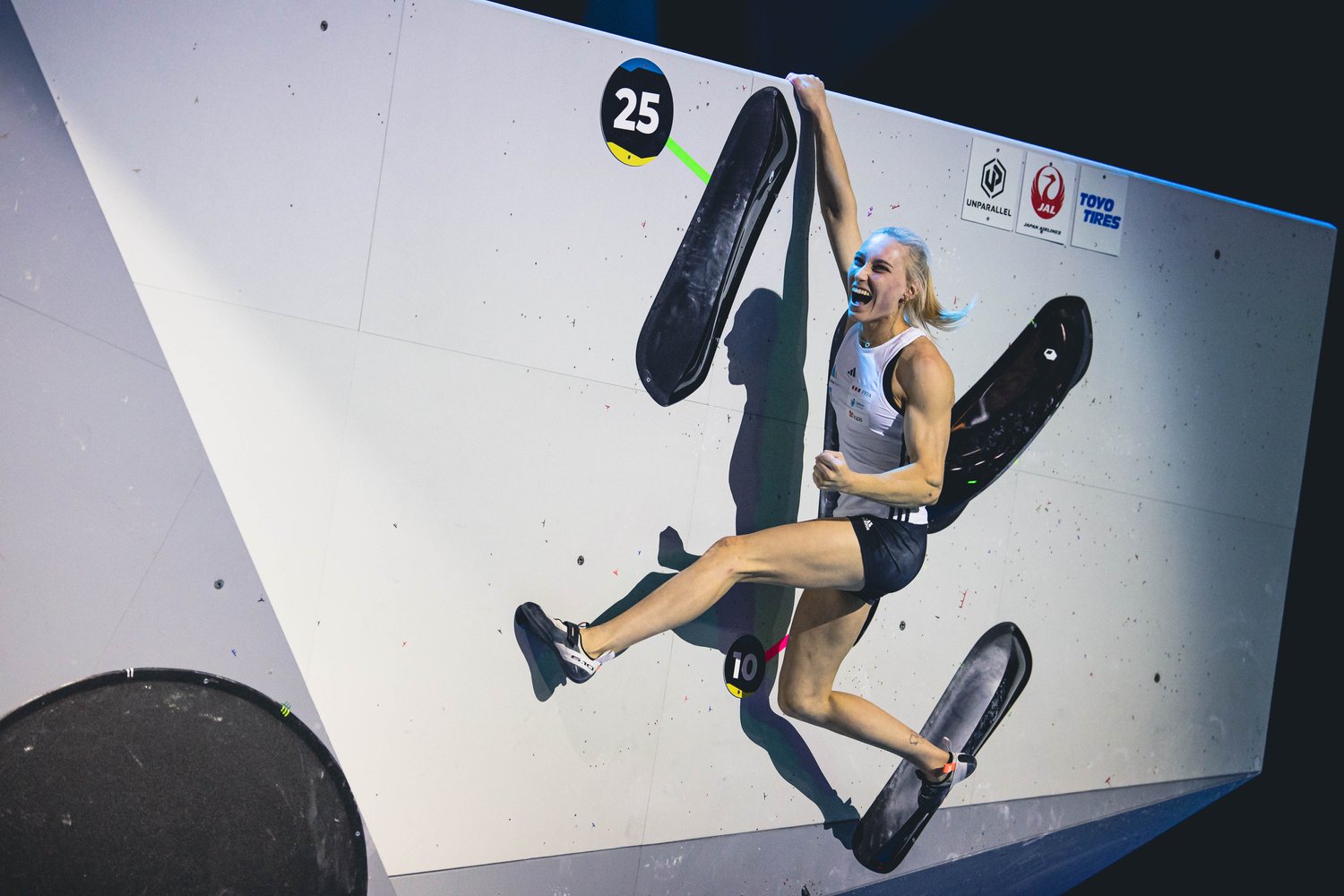
Climbing Gold start a new season with an interview with Janja Garnbret, talking about how she stays motivated, her feelings after the Olympics and how she uses her platform to improve climbing.
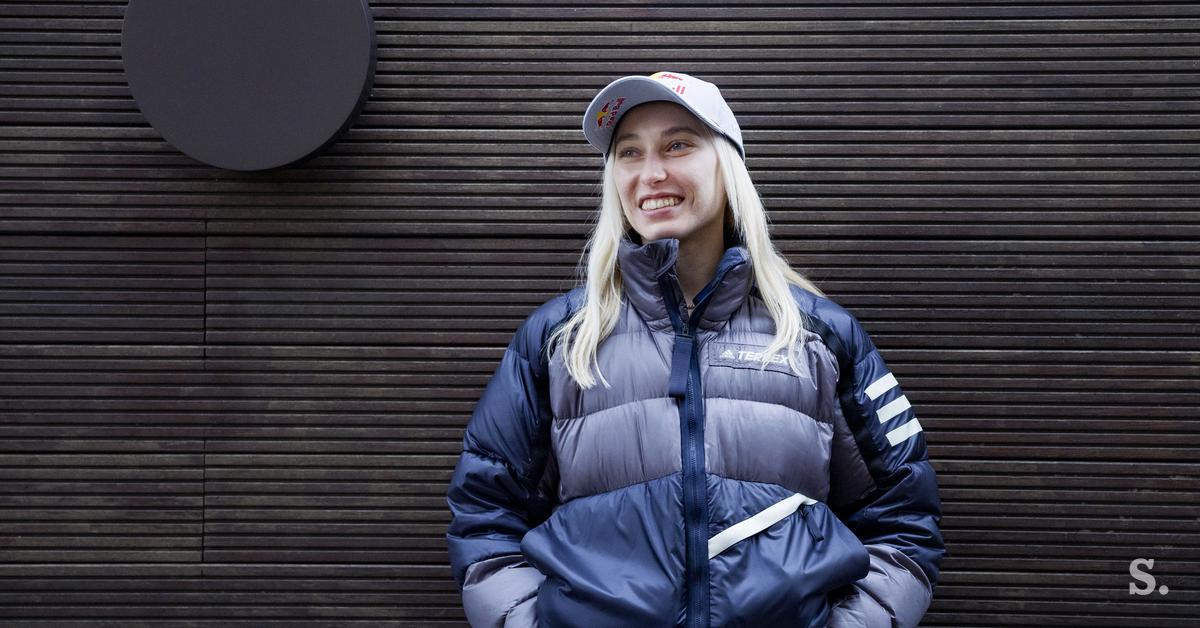
Janja Garnbret talks with Siol Sport on Sportal about her new responsibility as the 2025 Ambassador for Sport in Slovenia, her ambitions for the future, and how she thinks Sport Climbing can improve. (Google translate link)
Kyra talks with Jesse Grupper about his approach to training, how his mindset has changed, and how to use his platform for good.
Manu and Jake set a boulder outside for Studio Bloc Masters. Silliness ensues.
Competition Tickets
With the season approaching, I’ve gone hunting to find out where and when tickets will be available.
- 18th – 20th April Keqiao IFSC Boulder World Cup Tickets are available locally.
- 25th – 27th April Wujiang IFSC Lead & Speed World Cup Tickets are available locally.
- 2nd – 4th May Bali IFSC Lead & Speed World Cup The competition will be free to attend. It is not yet known if tickets are required for entry.
- 16th – 18th May Curitiba IFSC Boulder World Cup Ticket information still to be announced.
- 22nd – 25th May Salt Lake City IFSC Boulder World Cup and IFSC Paraclimbing World Cup Tickets are available through Eventbrite.
- 31st May – 1st June Denver IFSC Speed World Cup Tickets will be released around 2nd April through USA Climbing.
- 5th – 8th June Prague IFSC Boulder World Cup Tickets are still on sale.
- 12th – 115th June Bern IFSC Boulder World Cup Tickets are still on sale.
- 23rd – 29th June Innsbruck IFSC Boulder and Lead World Cup & IFSC Paraclimbing World Cup Tickets go on sale in April and June:
- 7th April: World Cup Passes for the whole event [Sold out]
- 28th April: Single Day Tickets - early phase.
- 16th June: Single Day Tickets - late phase.
- 5th – 6th July Krakow IFSC Speed World Cup This event is free of charge, and no tickets are required for entry.
- 11th – 13th July Chamonix IFSC Lead and Speed World Cup This event is free of charge, and no tickets are required for entry.
- 17th – 19th July Madrid IFSC Lead World Cup This event is free of charge. It is not yet known if tickets are required for entry.
- 28th July – 3rd August IFSC Youth World Championships in Helsinki. Tickets are for:
- 4th – 6th September Koper IFSC Lead World Cup Tickets will be made available here.
- 19th – 28th September Seoul IFSC World Championships Tickets will be needed for the following (All indoor events):
- Paraclimbing Finals
- Speed Qualification & Finals - Women and Men
- Lead Semi-finals & Finals - Women and Men
- Boulder Semi-finals & Finals - Women and Men
All other events are free of charge. However, access to the venue is limited, and entry is regulated on a first-come, first-serve basis.
- 23rd – 26th October Laval IFSC Paraclimbing World Cup Ticket information still to be announced.
What to Watch
The second North American Cup Series competition is happening this weekend in Murfreesboro, Tennessee, and it is a Lead competition.
Results can be found at the USA Climbing Results site and live streams (hopefully) will be available on the USA Climbing YouTube.
All times are local times (UTC-5).
Sunday 13th April







